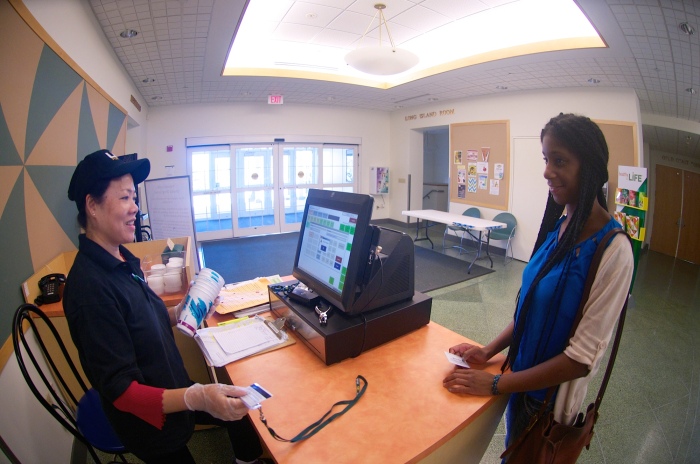By Kristen Linsalata
Assistant News Editor
This fall, there have been incessant complaints from students about the shortage of food at Winnick Dining Hall, as well as the low number of staff members working at Winnick, which, according to diners, is causing delays and difficulties when it comes to servicing students during meal times.
Students have reported that they have to wait in long lines with bad service, and that they aren’t provided healthy options, or even fresh food. “The only options there are [at Winnick] are hamburgers and pizza and the salad bar is usually stocked with lettuce that has been left out and is brown,” said Melissa Nosel, a junior English Library Science major.

Winnick’s hours have also caused some grumbling among students. Nosel says that Winnick doesn’t open until 7.30 a.m. However, like many students, Nosel has an 8 a.m. class. As a result, she is unable to get breakfast before her classes begin for the day.
“The one station that I love is the pasta station and it is closed half the time to keep open the pizza station because they don’t have enough staff to run all of the stations,” Nosel said. “There are six or seven stations, and most of the stations are closed because there is not enough staff to run them. The lines are out the door because they have one worker at each station trying to feed thousand[s of] students at [a] time, especially during common hour. I can’t count the amount of times that there were no utensils, no cereal, and the vending machines were broken.”
The lack of healthy options poses a problem for some students, especially those with medical conditions that make them unable to eat certain foods. Stacie Palacino, a senior Child Education major who underwent surgery to remove her gallbladder, has been forced to eliminate fats and gluten from her diet. Palacino claims that Winnick told her that they would accommodate her dietary needs, but there are still not a lot of healthy options and the salad bar is never stocked.
Ultimately, Palacino made the decision in Fall 2012 to become a commuter because of the lack of dietary options provided for her in the dining hall. “[Living on campus] just wasn’t working,” said Palacino. “I’m much happier now. I can make my food from home and I know that I’m eating healthy foods that I can eat, and not the greasy foods [that were provided for me at Winnick].”
Paul Carroll, Director of Operations of Aramark, the food service provider at LIU Post, states that there are no staff shortages at Winnick, and certainly no food shortages: “We currently have no [worker] shortages at Winnick Hall with the exception of some weekend coverage that is generally covered with student workers,” said Carroll. “We have 55 union members at Winnick Hall, and [many of them] are long-term union members who have served us well. We have no future plans of any change.”
Carroll also stated that the complaints of food shortages are unfounded. “We currently have the same amount of stations open as last semester,” Carroll said. “This includes pizza, pasta, street food, grill, home zone, dessert, salad bar, vegetarian-yogurt bar, deli, continental breakfast and cold food setup. There are no plans currently to change any food options, however we did introduce two new meal plans for commuter students.”
Resident students are used to using the magnetic stripe on the back of their student ID card in place of using cash to pay for food. LIU has instituted a brand new meal plan for commuter students that provide them the same food services as resident students. When a full-time commuter student uses their student ID card, they will automatically receive $50 to get them started. Commuter students will be able to choose from a 25 Block Plan, which provides 25 meals per semester and 50 dining dollars; a 50 Block Plan, which provides 50 meals per semester and 50 dining dollars; and the Commuter Dining Dollar Plan, which allows students to add more dollars to their plans at any time.
Despite this change, resident students believe that commuter students will only face the same problems that they do when it comes to the food selection and services.
“I’m cutting down my meal plan next semester,” said Nosel. “I have a meal plan for three meals a day, and yet I don’t use it most of the time because there is no food there a lot of the time and bad service.”
There are students who feel as though most of their dietary needs are being met with only little complaint or concern. “Overall, it could be worse,” said Kristy O’Connell, a junior Marketing major. “If I avoid the chicken then I’m usually very happy.”
The Pioneer was unable to receive a comment from Administration; Abagail Van Vlerah, the Dean of Students, referred Jackie Nealon, the Chief of Staff and Vice President of Enrollment, Campus Life, and Communications. Nealon chose not to comment on the matter, but referred to Aramark.






Be First to Comment